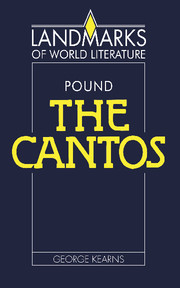3 - Representative figures
Published online by Cambridge University Press: 12 October 2018
Summary
The only American literary ancestor Pound recognizes is Whitman. He ignores Emerson, consciously at least, who for him and his fellow cosmopolitan exile, Eliot, represented vagueness, gentility and other aspects of American culture from which they wished to distance themselves. Yet Emerson's subtle prefatory chapter in Representative Men reflects much of the spirit behind Pound's selection of exemplary figures for the Cantos: “Other men are lenses through which we read our own minds. Each man seeks those of different quality from his own … seeks other men, and the otherest.” The varied heroes and heroines in the Cantos are an assembly of men and women (the latter much less prominent, but many), each irreducibly of his or her time, yet each a conduit for energies of intelligence and affection with which the “vital universe” is charged. I have taken eight names as crossings through which major themes may be examined: the Chinese sage, Confucius; an American orientalist, Ernest Fenollosa; the Latin poet, Ovid; a medieval philosopher, Scotus Erigena; the late medieval poet, Cavalcanti; an amateur British moral economist, C. H. Douglas; the second American president, John Adams; and the Italian dictator, Mussolini. They are lenses through which the poet reads his own mind, yet they provide the necessary difference and otherness. An odd assembly, perhaps, they represent the positive values within the Cantos.
Confucius: ethics and moral history
The matter of China enters the poem early, in Canto 4, as a flattering poet, So-Gyoku (fourth century BC), maintains that the wind in the palace curtains is not one the king shares with the people; but King Hsiang rejects the proposition that he can own the wind. The anecdote invites allegory: forces of nature should not become sources of individual profit, although the sharp move of the usurer is to convince us that something belonging to all belongs to him. Twelve lines later, Pdre Henri Jacques, a French Jesuit, longs to speak with Chinese spirits of the air on a sacred mountain, Rokku.
- Type
- Chapter
- Information
- Ezra Pound: The Cantos , pp. 57 - 106Publisher: Cambridge University PressPrint publication year: 1989

